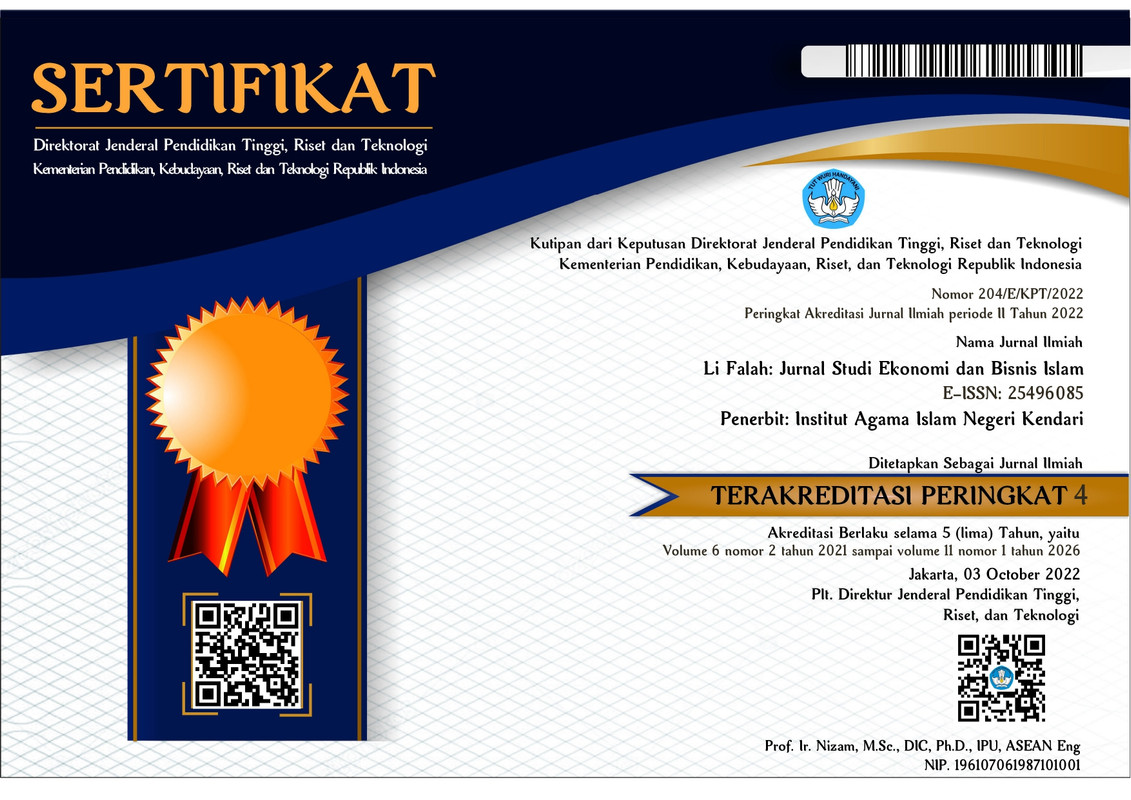The Impact of Islamic Work Ethics and Motivation on Employee Performance: A Case Study of BMT Ar-Rahmah Jaya Mulia, Central Lampung
Abstract
Keywords
Full Text:
PDFReferences
Adha, Risky Nur, Nurul Qomariah, and Achmad Hasan Hafidzi. "The Effect of Work Motivation, Work Environment, Work Culture on the Performance of Jember Regency Social Service Employees." Journal of Science and Technology Research 4, no. 1 (January 25, 2019): 47. https://doi.org/10.32528/ipteks.v4i1.2109.
Adiko, Ridho Gilang, and Nurul Saniah. "The Effect of Accounting Information Systems and Work Motivation on Employee Performance" 3 (2020).
Ahmad Janan Asifuddin. (2004). Etos Kerja Islami. Muhammadiyah University Press.
Ali, A. J., & Al-Owaihan, A. (2008). Islamic work ethic: A critical review. In Cross Cultural Management: An International Journal (Vol. 15, Issue 1). https://doi.org/10.1108/13527600810848791
Asroti, Asroti, Mochlasin Mochlasin, and Musalim Ridlo. "The Effect of Servant Leaders Islamic Work Ethic and Compensation on Employee Performance with Organization Citizenship Behavior (OCB) as an Intervening Variable." jesya 5, no. 2 (June 3, 2022): 2179–91. https://doi.org/10.36778/jesya.v5i2.782.
Asteria, Beta, and Achmad Nurkholis, "Analysis of the Effect of Training and Work Motivation on the Performance of PD BPR Bantul Employees," Indonesian Journal of Accounting and Business Research 1, no. 1 (September 30, 2021), https://doi.org/10.32477/jrabi.v1i1.331.
Badroen, Faisal, et al., Business Ethics in Islam. Jakarta: Kencana, 2006.
Bakker, A. B., & Demerouti, E. (2007). The Job Demands-Resources model: State of the art. In Journal of Managerial Psychology (Vol. 22, Issue 3). https://doi.org/10.1108/02683940710733115
Darusman, Indriyani, and Zidny Ilman Nafi. "The importance of intrinsic rewards and work motivation in improving employee performance." Al-Mustashfa: Journal of Sharia Economic Law Research 5, no. 1 (June 30, 2020): 80, https://doi.org/10.24235/jm.v5i1.6818.
Efrina, Lisa. "Islamic Work Ethic and Organizational Culture: Its Influence on the Performance of Shari'ah Multifinance Employees." Equilibrium: Journal of Sharia Economics 7, no. 2 (October 19, 2019): 259. https://doi.org/10.21043/equilibrium.v7i2.5808.
Fadhlurrohman, Ahnaf, and Fuad Mas'ud. "The Influence of Islamic Work Ethics and Islamic Organizational Culture on Employee Performance (Study on Binama Semarang KSPPS Employees)," Vol 11, No 3 (2022).
Fasa, Muhammad Iqbal, Siti Arifah, Tulus Suryanto, and Khumaidi Ja'far. "The Effect of Islamic Business Ethics and Compensation on Improving the Performance of Property Company Employees in Lampung Province." Gorontalo Management Research 3, no. 1 (April 29, 2020): 191. https://doi.org/10.32662/gomares.v3i1.889.
Ghofur, Ruslan Abdul. The Concept of Wages in Islamic Economics. Bandar Lampung: Arjasa Pratama, 2020.
Haryati, Yeni, Mohamad Andri Ibrahim, and Ira Siti Rohmah Maulida. "The Influence of Islamic Work Ethics on the Performance of BAZNAS Bandung City Employees." Journal of Sharia Economic Research 1, no. 1 (October 26, 2021): 59–62. https://doi.org/10.29313/jres.v1i2.197.
Herzberg, F., Mausner, B., & Snyderman, B. B. (1959). The motivation to work, 2nd ed. In The motivation to work, 2nd ed.
Jufrizen, Jufrizen. "The influence of work facilities and work discipline on employee performance through work motivation." Management Science 7, no. 1 (July 6, 2021): 35–54. https://doi.org/10.30656/sm.v7i1.2277.
Kilzer, E., & Skinner, B. F. (1953). Science and Human Behavior. The American Catholic Sociological Review, 14(2). https://doi.org/10.2307/3707860
Lailatirrohmah, Naafilah. "Faculty of Economics and Business, Diponogoro University, Semarang 2014," n.d.
Luthans, Fred. Organizational Behavior. Tenth Edition, Yogyakarta: Andi
Maksum, Ikhsan. "Islamic Leadership and Islamic Work Ethics: Its Influence on Employee Performance," Li Falah: Journal of Islamic Economic and Business Studies 5, no. 1 (June 23, 2020): 90, https://doi.org/10.31332/lifalah.v5i1.1923.
Mangkunegara, Anwar Prabu. Human Resource Management. Bandung: Remaja Rosdakarya, 2011.
Maslow, A. H. (2020). A theory of human motivation. Psychological Review. Climate Change Management, 13.
Mathis, Robert L. Human Resource Management. (Jakarta: Salemba Empat, 2002).
Muhammad, Muhammad. "Islamic Business Ethics" (Yogyakarta: UPP)
Muhzinat, Zumrotul. "The Influence of Work Motivation and Islamic Work Ethic on Employee Performance at Waroeng SPpesial Sambal" (Thesis, Universitas Islam Indonesia Yogyakarta, 2018).
Multitama. Islamic Business Strategy For Entrepreneurship. Jakarta: Zikrul Hakim, 2006.
Nasution, Ali Hanafiah and Dian Islamiati. "The influence of work ethics and organizational commitment on employee performance at PT Sealtek Prima Perkasa." Dynamic Management Journal 6, no. 1 (March 11, 2022): 10, https://doi.org/10.31000/dmj.v6il.6077
Nurhasanah, Nurhasanah, Jufrizen Jufrizen, and Zulaspan Tupti. "The influence of work ethics, organizational culture and workload on employee performance with job satisfaction as an intervening variable." Jesya (Journal of Sharia Economics & Economics) 5, no. 1 (January 1, 2022): 245–61. https://doi.org/10.36778/jesya.v5i1.618.
offset, 2005
Poerwadarminta, W.J.S. Big Dictionary Indonesian. Jakarta: Balai Pustaka, 2007.
Rahmawaty, Anita. Islamic Microeconomics. Holy: Nora Media Enterprise, 2011.
Rivai, Ahmad. "The Effect of Transformational Leadership and Organizational Culture on Employee Performance" 3 (2020).
Robbins, Stephen P. Organizational Behavior. Jakarta: PT Index Gramedia Group, 2006.
Siddiq, Siddiq, and Hadjiah. "Islamic Work Ethic And Employee Engagement, Variable To Improve Employee Job Satisfaction," The International Journal Of Business Review 2, Issue 1 (2019).
Susanto, Natalia. "The Effect of Work Motivation, Job Satisfaction, and Work Discipline on Employee Performance in the Sales Division of PT Rembaka" 7, no. 1 (2019).
Tanjung, Arwin, and Febsri Susanti. "The Influence of Leadership and Work Motivation on Employee Performance in the Economic Sector of the Arrisalah Waqf Foundation." Journal of Bina Bangsa Ekonomika 15, no. 2 (August 8, 2022): 530–42. https://doi.org/10.46306/jbbe.v15i2.194.
Vroom, V. H., & Jaago, A. G. (2007). The role of the situation in leadership. American Psychologist, 62(1). https://doi.org/10.1037/0003-066X.62.1.17
DOI: http://dx.doi.org/10.31332/lifalah.v9i1.9841
Copyright (c) 2024 Widia Peftiani, Evi Ekawati, Rahmat Fajar Ramdani

This work is licensed under a Creative Commons Attribution-ShareAlike 4.0 International License.
Li Falah : Jurnal Studi Ekonomi dan Bisnis Islam, Indexed In
Accredited By
View My Stats
Organized by : Fakultas Ekonomi dan Bisnis Islam
Published by : Institut Agama Islam Negeri Kendari
Jl. Sultan Qaimuddin No. 17 Baruga Kota Kendari Provinsi Sulawesi Tenggara
phone. +62401-3193710
Fax. +62401-3193710
Email: [email protected]












